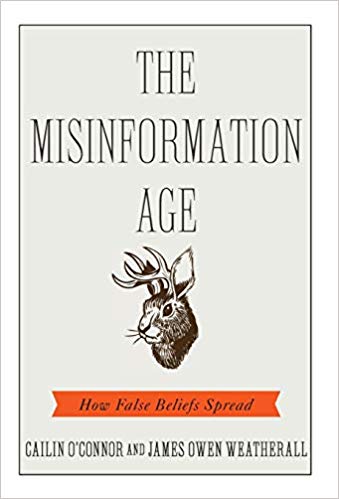“3 Reasons for the Rise of Fake News
Cailin O’Connor explains the shift in American politics.
By Walter Veit
https://medium.com/science-and-philosophy/3-reasons-for-the-rise-of-fake-news-f0095c652533
Walter Veit: You recently published The Misinformation Age together with your husband and fellow philosopher James Owen Weatherall. What motivated you to write this book?
Cailin O’Connor: Around the time of the Brexit vote and the 2016 election in the US, I was working on several projects in formal social epistemology — using models to represent scientific communities. Social epistemology puts a big emphasis on the importance of social connections to knowledge creation. At the same time, we were seeing some serious issues related to public misinformation through social media. Many responses to this misinformation seemed to focus on the role of individual psychology and reasoning in the spread of false belief. For instance, confirmation bias, where individuals trust evidence that supports an already-held belief, is obviously relevant. But we think that understanding social ties and behavior is even more important to understanding false belief. For that reason, we wanted to bring some of the most important lessons from social epistemology, and from models of scientific knowledge, to bear on these social problems.
Walter Veit: How do you explain that despite all the evidence, demonstrably false beliefs are able to spread and persist?
Cailin O’Connor: There are many reasons that false beliefs spread, often in spite of good evidence refuting them. One reason is that we all are used to trusting other humans as sources of information. This is, to some degree, a necessity. We certainly cannot go do the work ourselves to guarantee that all our beliefs are good ones. Even when we look to scientific journals for evidence supporting our beliefs, we are ultimately trusting others (the scientists who share their data). And sometimes even these good sources lead us astray. The social sharing of data is powerful, but always opens the possibility that falsity can spread. In addition, there are various social biases that can make us more or less likely to share false beliefs. For example, in our book, we talk about the role of conformity bias — when individuals want to conform their actions or beliefs to their peers — in sometimes preventing the spread of useful or accurate knowledge. Our heuristics for social trust, such as placing more trust in those who are more similar to ourselves, or who share our beliefs, can mislead.
(…)
This interview originally appeared in Psychology Today [Apr 17, 2019]”

